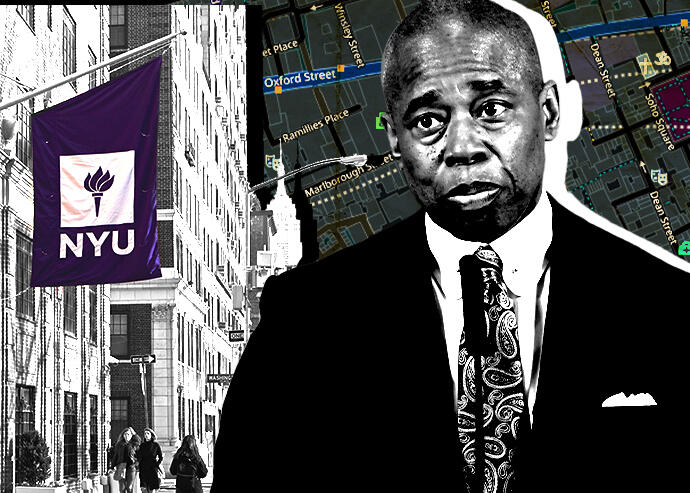
New York City mayor Eric Adams (Getty Images, iStock)
The latest group taking its issues with the Soho rezoning to the courts? One of the city’s preeminent academic institutions.
New York University filed a lawsuit on Thursday in New York State Supreme Court, the Commercial Observer reported. The school is looking to eliminate a provision that prevents college and university use in the rezoned area.
NYU argues the provision violates the Cornell Doctrine, which doesn’t allow for blanket exclusions of church or school use in the area. The school is arguing that the provision was added at the last minute on the heels of community concerns about NYU’s large presence in the area.
According to the Observer, NYU doesn’t have any immediate plans to expand its stock of classrooms or dormitories, but the school doesn’t want to be prevented from doing so in the future.
“It’s the responsibility of the current NYU leadership to ensure that universities’ rights under the law are not violated by an unconstitutional provision of the rezoning,” NYU spokesperson John Beckman said in a statement.
A spokesperson for the NYC Law Department told the Observer the agency hadn’t yet seen the lawsuit.
Lawsuits challenging rezoning don’t often succeed, though it appears the school isn’t trying to block the rezoning, only one aspect of it. Still, it’s not the only legal challenge to the rezoning.
In February, the Coalition for Fairness in Soho and Noho sued the city and the mayor, alleging the purported goal of creating affordable housing in the area was a “pretext to facilitate the demolition of historic landmarks, and thereafter promote the proliferation of big-box chain stores, office buildings, and luxury housing.” The group claimed the rezoning of Soho and Noho was unconstitutional and violated the state’s Environmental Quality Review Act.
A court date in that lawsuit is set for June 3, according to the Observer.
The Soho and Noho rezoning was approved at the end of 2021, as many City Council members were already halfway out the door. The rezoning allows for residential and commercial uses in areas previously zoned for manufacturing. The zoning change also lifted a restriction against ground-floor retail, though special permits may still be needed based on the size of the store.
[CO] — Holden Walter-Warner


